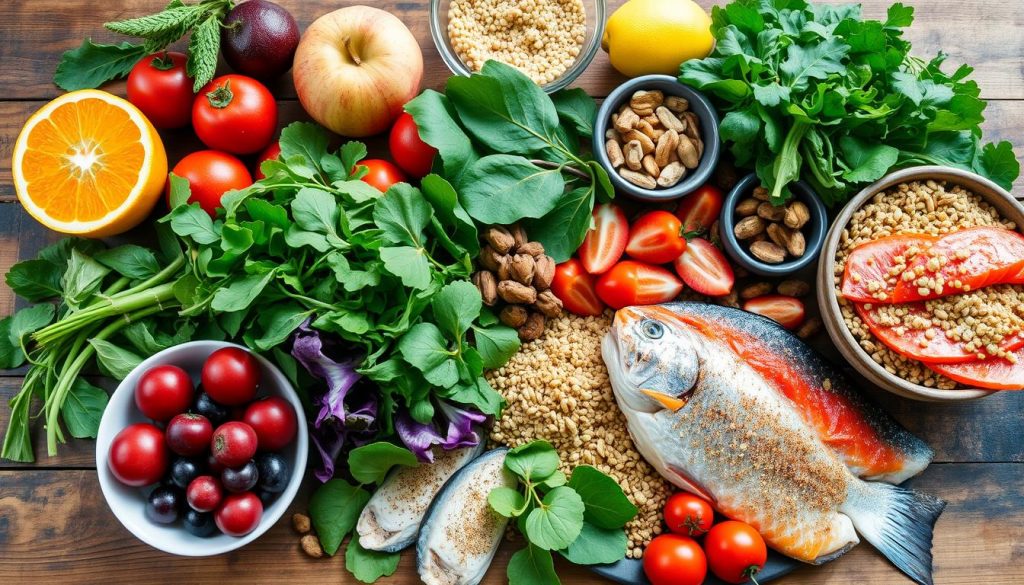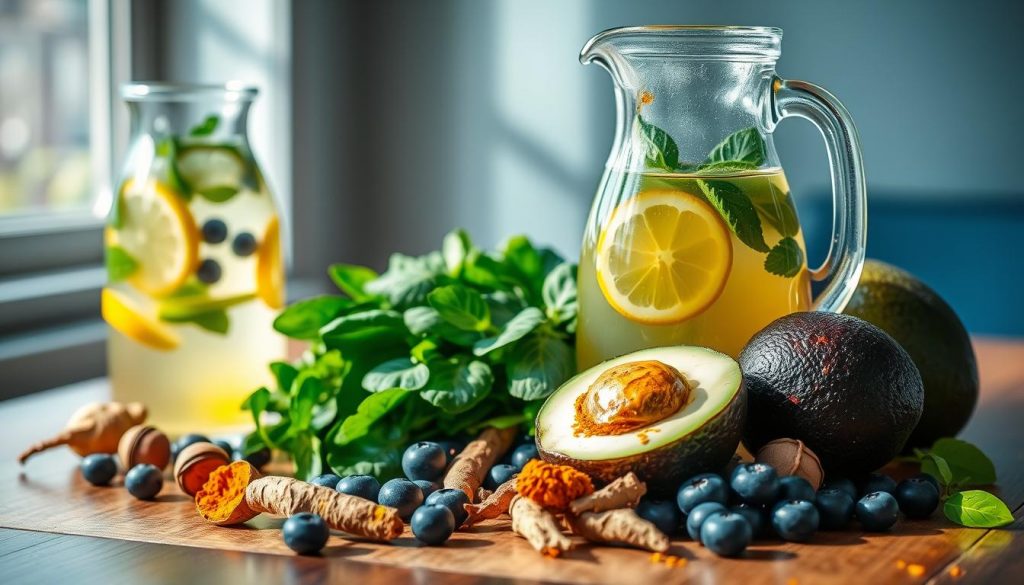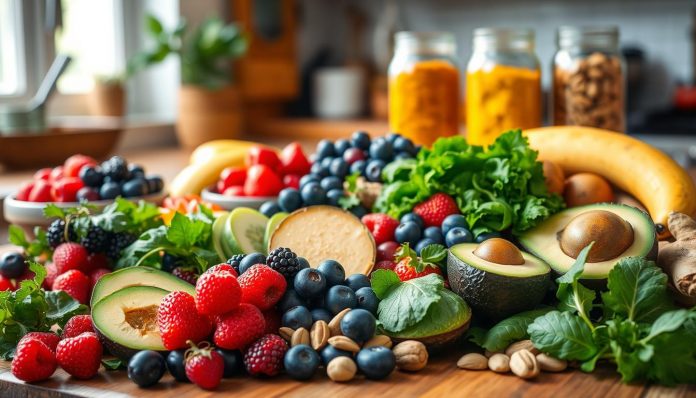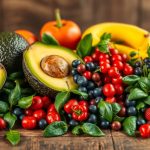Thinking about changing your lifestyle? An Anti-Inflammatory Diet can greatly improve your health. It helps lower the risk of serious diseases like heart disease, diabetes, and cancer. It also boosts your overall health.
This diet is all about eating whole, unprocessed foods. Think fruits, veggies, whole grains, and healthy fats. These foods are packed with nutrients and antioxidants that fight inflammation. Making these simple changes can greatly benefit your health.
Table of Contents
Introduction to Anti-Inflammatory Diet
Understanding the Anti-Inflammatory Diet is key to a healthier life. It’s more than just a diet; it’s a lifestyle choice. By choosing this diet, you’re on your way to a healthier, happier you.
Key Takeaways
- Embracing an Anti-Inflammatory Diet can reduce your risk of chronic diseases
- The Anti-Inflammatory Diet focuses on whole, unprocessed foods
- Anti-inflammatory foods provide essential nutrients and antioxidants
- An Anti-Inflammatory Diet can improve your overall health effects of an Anti-Inflammatory Diet
- Making simple changes to your lifestyle can have a significant impact on your health
- The benefits of an Anti-Inflammatory Diet include reducing inflammation and improving overall health
Understanding Inflammation and Its Effects
Inflammation is how your body reacts to injury or infection. Eating an inflammation-fighting diet can lower your risk of chronic diseases. Foods like fruits and vegetables can lessen inflammation’s harm.
Knowing the difference between acute and chronic inflammation is key. Acute inflammation is a quick response to injury or infection. Chronic inflammation, on the other hand, can cause long-term damage and disease. Eating the best foods for inflammation can help prevent chronic diseases and improve your health.
To create a good inflammation-fighting diet, understand how inflammation relates to disease. Some foods can cause inflammation, while others can reduce it. Choosing the right foods can help control inflammation and improve your health.
What is an Anti-Inflammatory Diet?
An anti-inflammatory diet focuses on whole, unprocessed foods. These foods give you the nutrients and antioxidants you need. To start an anti-inflammatory diet, add foods that fight inflammation and boost health. A good anti-inflammatory meal plan can guide you.
To begin an anti-inflammatory diet, know the basics. Eat more fruits, vegetables, whole grains, and healthy fats. Stay away from processed and sugary foods. Look for anti-inflammatory recipes online to help you start.
Key Principles of the Diet
The diet’s core is about choosing your food wisely. Eat foods packed with antioxidants, like berries. Also, include healthy fats from fatty fish.
Common Foods to Include
- Fatty fish, such as salmon
- Fruits, like berries and citrus fruits
- Whole grains, including brown rice and quinoa
- Healthy fats, like avocado and nuts
Foods to Avoid
It’s also important to limit certain foods. Avoid processed meats, sugary drinks, and refined carbs. They can cause inflammation.
Benefits of an Anti-Inflammatory Diet
Adopting an anti-inflammatory diet can greatly improve your health and well-being. It helps lower the risk of chronic diseases like heart disease and diabetes. This diet also provides essential nutrients and antioxidants that reduce stress and promote relaxation.
The benefits of an anti-inflammatory diet include:
- Reducing chronic disease risk
- Improving overall well-being
- Enhancing mental health
By adding an anti-inflammatory diet to your lifestyle, you’ll see health improvements. It’s a smart way to manage your health and lower disease risks.
Essential Anti-Inflammatory Foods
The foods you eat are key in fighting inflammation. Adding the right foods to your diet can help reduce chronic inflammation. This can improve your health overall. We will look at the best foods for inflammation, including fruits, vegetables, healthy fats, and whole grains.
Let’s start with the top foods for reducing inflammation. These include:
- Berries, such as blueberries and raspberries, which are rich in antioxidants and polyphenols
- Leafy greens, like spinach and kale, which are packed with vitamins and minerals
- Fatty fish, such as salmon and sardines, which are high in omega-3 fatty acids
- Whole grains, like brown rice and quinoa, which provide fiber and essential nutrients
You can add these foods to your diet in many ways. For instance, you can mix berries into your oatmeal or yogurt. Leafy greens are great in salads and smoothies. Healthy fats like avocado and olive oil are perfect for cooking and dressings.
Eating these foods daily can help reduce chronic inflammation. It can also improve your health. Remember to drink plenty of water and avoid processed and sugary foods. With the right foods and a balanced lifestyle, you can control your health and lower your risk of chronic diseases.
| Foods | Benefits |
|---|---|
| Berries | Rich in antioxidants and polyphenols |
| Leafy Greens | Packed with vitamins and minerals |
| Fatty Fish | High in omega-3 fatty acids |
| Whole Grains | Provide fiber and essential nutrients |
Spices and Herbs That Fight Inflammation
Starting an inflammation-fighting diet means adding spices and herbs with anti-inflammatory powers. These natural ingredients boost your meal plan’s effectiveness. Turmeric, ginger, and garlic are top choices for their anti-inflammatory benefits.
These spices and herbs can lower chronic inflammation, which is linked to many diseases. Adding them to your diet can lower your risk of chronic illnesses and boost your health. For instance, turmeric has curcumin, a compound with strong anti-inflammatory and antioxidant effects.
- Turmeric: contains curcumin, a potent anti-inflammatory compound
- Ginger: has anti-inflammatory compounds that help reduce pain and inflammation
- Garlic: has anti-inflammatory properties that help reduce the risk of chronic diseases
By adding these spices and herbs to your meals, you can make tasty, healthy dishes. Always pick fresh, high-quality ingredients for the best results in your inflammation-fighting diet.
| Spice/Herb | Anti-Inflammatory Properties |
|---|---|
| Turmeric | Curcumin, potent anti-inflammatory and antioxidant effects |
| Ginger | Anti-inflammatory compounds that reduce pain and inflammation |
| Garlic | Anti-inflammatory properties that reduce the risk of chronic diseases |
Planning Your Anti-Inflammatory Diet
To start an anti-inflammatory diet, you need a solid plan. This includes making a weekly meal plan, a grocery list, and controlling portions. Your diet should be full of whole foods and healthy fats, avoiding foods that cause inflammation.
When planning meals, look for anti-inflammatory recipes with omega-3s, antioxidants, and fiber. Include a variety of fruits, veggies, and whole grains. You can find many anti-inflammatory recipes online or in cookbooks to help you.

To simplify grocery shopping, list essential anti-inflammatory foods. These include:
- Fatty fish like salmon and sardines
- Leafy greens like spinach and kale
- Nuts and seeds like walnuts and chia seeds
- Whole grains like brown rice and quinoa
Remember to control portions to keep a healthy weight and lower inflammation. With some planning and creativity, you can make a tasty and healthy anti-inflammatory meal plan.
Recipes for an Anti-Inflammatory Lifestyle
Living an anti-inflammatory lifestyle is tasty and simple. You can pick from many recipes. These meals focus on the best foods for inflammation. An anti-inflammatory diet lowers disease risk and boosts health.
Start your day with overnight oats and berries or avocado toast. These dishes are not just yummy but also full of nutrients. For breakfast, also add fatty fish like salmon and whole grains like quinoa.
Here are some anti-inflammatory recipes to try:
- Grilled salmon with roasted vegetables
- Quinoa bowls with lean turkey and avocado
- Energy balls made with oats and honey
These anti-inflammatory recipes are key to a healthy anti-inflammatory diet. They help you reach your wellness goals.
Adding these anti-inflammatory recipes to your meals is a great start. Always pick the best foods for inflammation and follow an anti-inflammatory diet for the best results.
| Recipe | Ingredients | Benefits |
|---|---|---|
| Overnight Oats | Rolling oats, berries, nuts | Rich in fiber, antioxidants, and healthy fats |
| Grilled Salmon | Salmon, vegetables, quinoa | High in omega-3 fatty acids, protein, and fiber |
| Energy Balls | Oats, honey, nuts | Rich in fiber, protein, and healthy fats |
Incorporating Exercise with Your Diet
Regular physical activity is key to a healthy life. When you add an anti-inflammatory diet to your routine, it boosts your health even more. This combo improves heart health, mental well-being, and lowers disease risk.
Choosing the right exercises is important. Aerobic, strength training, and high-intensity interval training are great choices. They fight chronic inflammation, boost circulation, and improve fitness. An anti-inflammatory diet and regular exercise can make you feel more energetic and protect you from diseases.
Remember, the best results come from a balanced lifestyle. This includes regular exercise and staying hydrated. For tips on blending exercise and diet into your life, check out community.triblive.com. It highlights the value of a holistic health approach.
The Role of Hydration in Inflammation
Staying hydrated is key to reducing inflammation in the body. When you eat an anti-inflammatory diet, don’t forget the importance of water. Drinking enough water helps remove toxins and waste that can cause inflammation.
Studies show that even a little dehydration can raise inflammatory markers. But, drinking enough water can lower these markers by 25-30%. This is great for those on an anti-inflammatory diet, as it boosts the diet’s benefits and helps fight inflammation.
To stay hydrated, drink at least 8 cups (64 ounces) of water a day. You can also have herbal teas and eat foods with lots of water. These habits can lower your risk of chronic diseases and improve your health, aligning with an anti-inflammatory diet’s goals.

Besides water, some foods and drinks can also fight inflammation. For instance, herbal teas like ginger and turmeric tea have compounds that reduce inflammation. By drinking water and adding these foods to your diet, you support your body’s fight against inflammation and enhance the benefits of an anti-inflammatory diet.
Supplements for Inflammation Management
As you keep working on your anti-inflammatory diet, think about adding supplements. They can boost the benefits of anti-inflammatory diet and lessen the health effects of anti-inflammatory diet. Some supplements help lower chronic inflammation and better your health.
Some key supplements for managing inflammation include:
- Omega-3 fatty acids, found in fatty fish and flaxseeds, which have anti-inflammatory effects
- Antioxidants, such as vitamins C and E, which can help reduce oxidative stress and inflammation
- Probiotics, found in fermented foods and supplements, which can help regulate the gut microbiome and reduce inflammation
Adding these supplements to your diet can lower your risk of chronic diseases and improve your health. Always talk to a healthcare professional before starting any new supplements.
Remember, a balanced anti-inflammatory diet and a healthy lifestyle are key for managing inflammation and achieving optimal health. By mixing a nutritious diet with the right supplements, you can enjoy the benefits of anti-inflammatory diet and reduce the health effects of anti-inflammatory diet.
| Supplement | Benefits |
|---|---|
| Omega-3 fatty acids | Reduces inflammation, improves heart health |
| Antioxidants | Reduces oxidative stress, improves overall health |
| Probiotics | Regulates gut microbiome, reduces inflammation |
Success Stories: Real People Changing Their Lives
Many people have changed their lives by following an anti-inflammatory diet. This diet helps reduce inflammation and improves health. It includes eating foods that fight inflammation and avoiding those that cause it.
By doing this, individuals see big improvements. They feel less pain, have lower disease risk, and feel better mentally.
An anti-inflammatory diet also offers long-term health benefits. It can help you lose weight, improve digestion, and boost energy. To get these benefits, eat whole, nutrient-rich foods and avoid processed and sugary ones.
Case Study: A Journey to Health
One person with chronic pain and inflammation found relief with an anti-inflammatory diet. They made lifestyle changes and saw their symptoms lessen. This improved their life quality greatly.
Testimonials on Dietary Changes
Many have seen positive changes after switching to an anti-inflammatory diet. Here are some common stories:
- Reduced inflammation and improved joint health
- Enhanced mental clarity and focus
- Improved digestion and reduced symptoms of irritable bowel syndrome
Challenges and How to Overcome Them
Starting an anti-inflammatory diet can be tough, but it’s doable. Stay focused and gather support to keep up with your new habits. This will help you stick to your diet and lifestyle changes.
Common Obstacles
Many struggle with finding time to cook healthy meals. Not knowing what anti-inflammatory foods are can also be a hurdle. Social situations, like eating out, can make it hard to follow your diet.
Staying Motivated
Remember the good things about an anti-inflammatory diet. It can reduce inflammation and improve your health. Celebrate your small victories and don’t get too down if you make mistakes. Having supportive friends and family helps a lot.
Building a Support System
Getting your family involved can really help. Let them help with meal planning and cooking. You can also join groups or online forums to find others who are on the same path.
By getting ready for these challenges, you can beat them. Stay positive, and with a strong support system, you’ll reach your wellness goals.
FAQ
What is an anti-inflammatory diet?
What are the benefits of an anti-inflammatory diet?
What are some common foods to include in an anti-inflammatory diet?
What foods should be avoided on an anti-inflammatory diet?
What are some anti-inflammatory spices and herbs?
How can I plan an effective anti-inflammatory meal plan?
What are some examples of anti-inflammatory recipes?
How can exercise and hydration support an anti-inflammatory diet?
What supplements can help reduce inflammation?
How can I overcome challenges when transitioning to an anti-inflammatory diet?
Source Links
- 7 Factors That Can Affect Cognitive Decline—And What You Can Do About Them – https://www.eatingwell.com/factors-that-help-reduce-cognitive-decline-risk-8772060
- Your Questions About Wildfire Smoke and Health, Answered – https://www.yahoo.com/news/questions-wildfire-smoke-health-answered-201741241.html
- 14 Best New Smoothies To Start Your Day – https://www.eatingwell.com/best-new-smoothies-to-start-your-day-8772195
- How stress fuels allergic skin inflammation – https://www.news-medical.net/news/20250109/How-stress-fuels-allergic-skin-inflammation.aspx
- Foods That Fight Inflammation | @amacforamerica – https://amac.us/blog/amac-active/foods-that-fight-inflation/
- This Indian herb has been shown to improve memory and brain health – https://nypost.com/2025/01/09/health/ancient-herb-taking-brain-health-to-the-next-level-revealed/
- The 5 Anti-Inflammatory Habits I Do Every Day to Reduce My Skin Inflammation – https://www.eatingwell.com/anti-inflammatory-habits-i-do-for-skin-inflammation-8772096
- 5 of the Best Fish to Eat—According to a Nutritionist, Chef, and Fishmonger – https://www.aol.com/5-best-fish-eat-according-175523895.html
- Best Mushroom Coffee If You’re Adaptogen Curious – https://www.bonappetit.com/story/best-mushroom-coffee
- Exclusive: Arianna Huffington’s Thrive Global inks novel partnership with pharma giant Eli Lilly – https://www.yahoo.com/lifestyle/exclusive-arianna-huffington-thrive-global-134004728.html
- Bluffton’s future is looking healthier: Novant Health announces $320 million hospital – https://www.yahoo.com/news/bluffton-future-looking-healthier-novant-154058883.html
- 20 Low-Calorie Lunches for the Mediterranean Diet – https://www.eatingwell.com/mediterranean-diet-low-calorie-lunch-recipes-8772055
- Does Rosemary Oil Work for Hair Growth? – https://www.oprahdaily.com/beauty/hair/g62977950/best-rosemary-oil-for-hair-growth/
- CelluCare Reviews — [Updated 2025] My Honest Feedback, Pros, Cons, Ingredients – Tribune-Review – https://community.triblive.com/article/preview/ef8e79ce-6ffc-4c90-a683-8819257fbf13
- Handmade Copper Crockery in Pakistan | What You Need to… – https://www.invastor.com/blog/53467-Handmade-Copper-Crockery-in-Pakistan–What-You-Need-to-Know/
- This New Superdrink Lowers Blood Sugar, Aids Weight Loss, And Improves Gut Health – https://www.timesnownews.com/health/this-new-superdrink-lowers-blood-sugar-aids-weight-loss-and-improves-gut-health-article-117094198
- Wellness Experts Share Their Go-To Supplements – https://sheerluxe.com/life/health-wellness/wellness-experts-share-their-go-to-supplements
- Morning Coffee May Offer the Most Heart-Health Benefits – https://www.everydayhealth.com/heart-health/drinking-coffee-only-in-the-morning-heart-health-benefits/












